Indians generally see high levels of religious freedom in their country. Overwhelming majorities of people in each major religious group, as well as in the overall public, say they are “very free” to practice their religion. Smaller shares, though still majorities within each religious community, say people of other religions also are very free to practice their religion. Relatively few Indians – including members of religious minority communities – perceive religious discrimination as widespread.
At the same time, perceptions of discrimination vary a great deal by region. For example, Muslims in the Central region of the country are generally less likely than Muslims elsewhere to say there is a lot of religious discrimination in India. And Muslims in the North and Northeast are much more likely than Muslims in other regions to report that they, personally, have experienced recent discrimination.
Indians also widely consider communal violence to be an issue of national concern (along with other problems, such as unemployment and corruption). Most people across different religious backgrounds, education levels and age groups say communal violence is a very big problem in India.
The partition of the Indian subcontinent in 1947 remains a subject of disagreement. Overall, the survey finds mixed views on whether the establishment of Hindu-majority India and Muslim-majority Pakistan alleviated communal tensions or stoked them. On balance, Muslims tend to see Partition as a “bad thing” for Hindu-Muslim relations, while Hindus lean slightly toward viewing it as a “good thing.”
Most Indians say they and others are very free to practice their religion
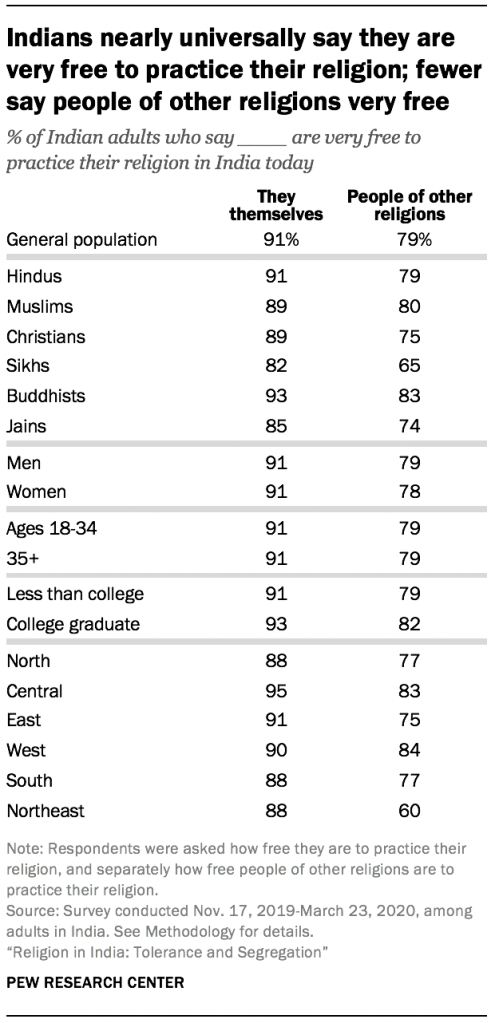
The vast majority of Indians say they are very free today to practice their religion (91%), and all of India’s major religious groups share this sentiment: Roughly nine-in-ten Buddhists (93%), Hindus (91%), Muslims (89%) and Christians (89%) say they are very free to practice their religion, as do 85% of Jains and 82% of Sikhs.
Broadly speaking, Indians are more likely to view themselves as having a high degree of religious freedom than to say that people of other religions are very free to practice their faiths. Still, 79% of the overall public – and about two-thirds or more of the members of each of the country’s major religious communities – say that people belonging to other religions are very free to practice their faiths in India today.
Generally, these attitudes do not vary substantially among Indians of different ages, educational backgrounds or geographic regions. Indians in the Northeast are somewhat less likely than those elsewhere to see widespread religious freedom for people of other faiths – yet even in the Northeast, a solid majority (60%) say there is a high level of religious freedom for other religious communities in India.
Most people do not see evidence of widespread religious discrimination in India
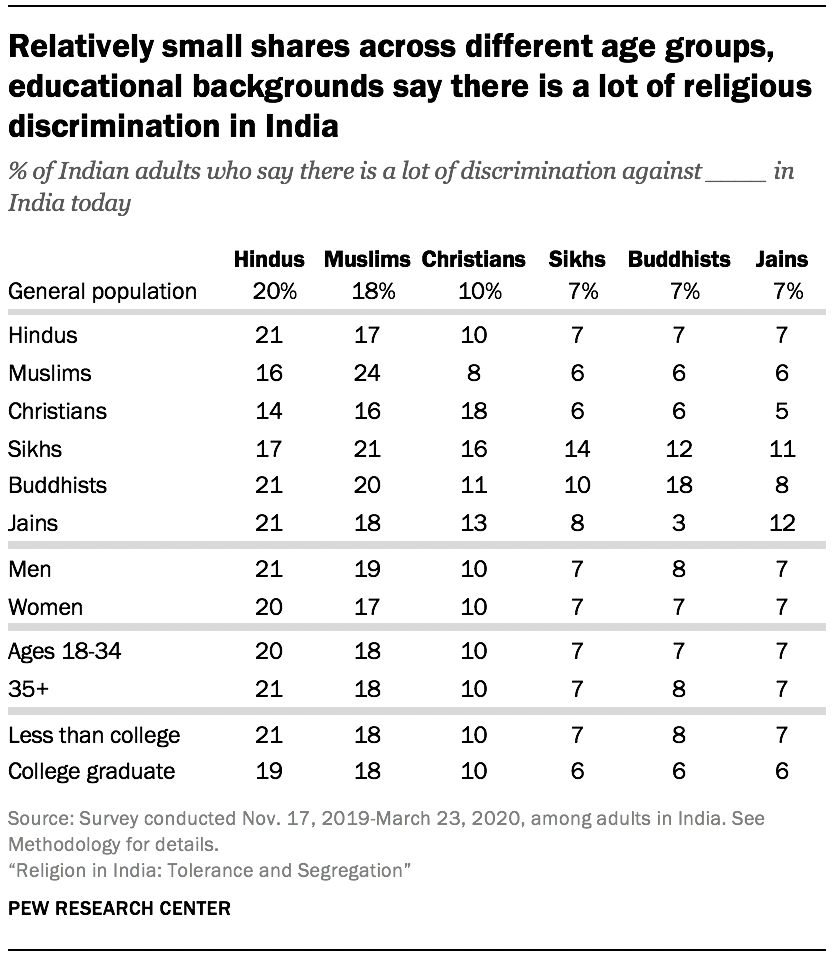
Most people in India do not see a lot of religious discrimination against any of the country’s six major religious groups. In general, Hindus, Muslims and Christians are slightly more likely to say there is a lot of discrimination against their own religious community than to say there is a lot of discrimination against people of other faiths. Still, no more than about one-quarter of the followers of any of the country’s major faiths say they face widespread discrimination.
Generally, Indians’ opinions about religious discrimination do not vary substantially by gender, age or educational background. For example, among college graduates, 19% say there is a lot of discrimination against Hindus, compared with 21% among adults with less education.
Within religious groups as well, people of different ages, as well as both men and women, tend to have similar opinions on religious discrimination.
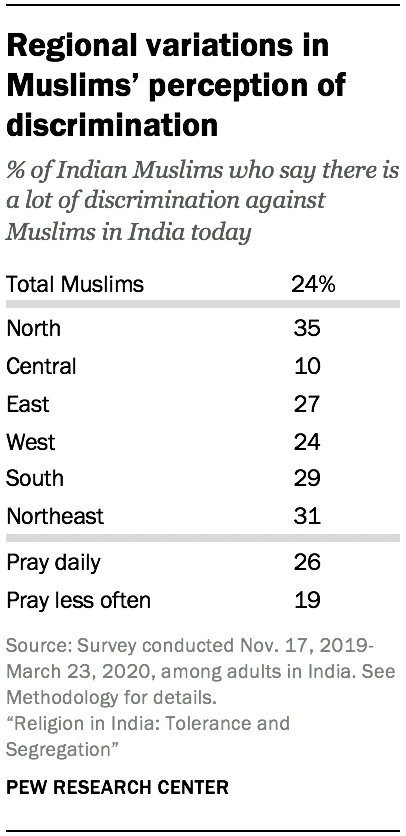
However, there are large regional variations in perceptions of religious discrimination. For example, among Muslims who live in the Central part of the country, just one-in-ten say there is widespread discrimination against Muslims in India, compared with about one-third of those who live in the North (35%) and Northeast (31%). (For more information on measures of religious discrimination in the Northeast, see “In Northeast India, people perceive more religious discrimination” below.)
Among Muslims, perceptions of discrimination against their community can vary somewhat based on their level of religious observance. For instance, about a quarter of Muslims across the country who pray daily say there is a lot of discrimination against Muslims (26%), compared with 19% of Muslims nationwide who pray less often. This difference by observance is pronounced in the North, where 39% of Muslims who pray every day say there is a lot of discrimination against Muslims in India, roughly twice the share among those in the same region who pray less often (20%).
Most Indians report no recent discrimination based on their religion

The survey also asked respondents about their personal experiences with discrimination. In all, 17% of Indians report facing recent discrimination based on their religion. Roughly one-in-five Muslims (21%) and 17% of Hindus say that in the last 12 months they themselves have faced discrimination because of their religion, as do 18% of Sikhs. By contrast, Christians are less likely to say they have felt discriminated against because of their religion (10%), and similar shares of Buddhists and Jains (13% each) fall into this category.
Nationally, men and women and people belonging to different age groups do not differ significantly from each other in their experiences with religious discrimination. People who have a college degree, however, are somewhat less likely than those with less formal schooling to say they have experienced religious discrimination in the past year.
Within religious groups, experiences with discrimination vary based on region of residence and other factors. Among Muslims, for instance, 40% of those living in Northern India and 36% in the Northeast say they have faced recent religious discrimination, compared with no more than one-in-five in the Southern, Central, Eastern and Western regions.
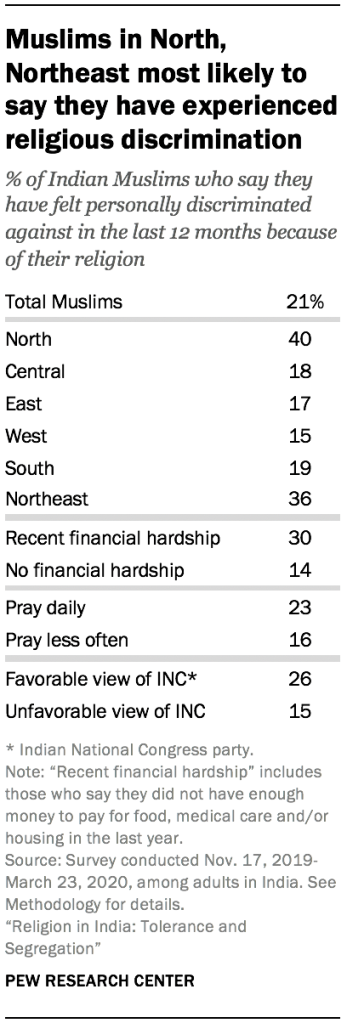
Experiences with religious discrimination also are more common among Muslims who are more religious and those who report recent financial hardship (that is, they have not been able to afford food, housing or medical care for themselves or their families in the last year).
Muslims who have a favorable view of the Indian National Congress party (INC) are more likely than Muslims with an unfavorable view of the party to say they have experienced religious discrimination (26% vs. 15%). Among Northern Muslims, those who have a favorable view of the INC are much more likely than those who don’t approve of the INC to say they have experienced discrimination (45% vs. 23%). (Muslims in the country, and especially Muslims in the North, tend to say they voted for the Congress party in the 2019 election. See Chapter 6.)
Hindus with less education and those who have recently experienced poverty also are more likely to say they have experienced religious discrimination.
In Northeast India, people perceive more religious discrimination
Less than 5% of India’s population lives in the eight isolated states of the country’s Northeastern region. This region broadly lags behind the country in economic development indicators. And this small segment of the population has a linguistic and religious makeup that differs drastically from the rest of the country.
According to the 2011 census of India, Hindus are still the majority religious group (58%), but they are less prevalent in the Northeast than elsewhere (81% nationally). The smaller proportion of Hindus there is offset by the highest shares of Christians (16% vs. 2% nationally) and Muslims (22% vs. 13% nationally) in any region. And based on the survey, the region also has a higher share of Scheduled Tribes than any other region in the country (25% vs. 9% nationally), and half of Scheduled Tribe members in the Northeast are Christians.
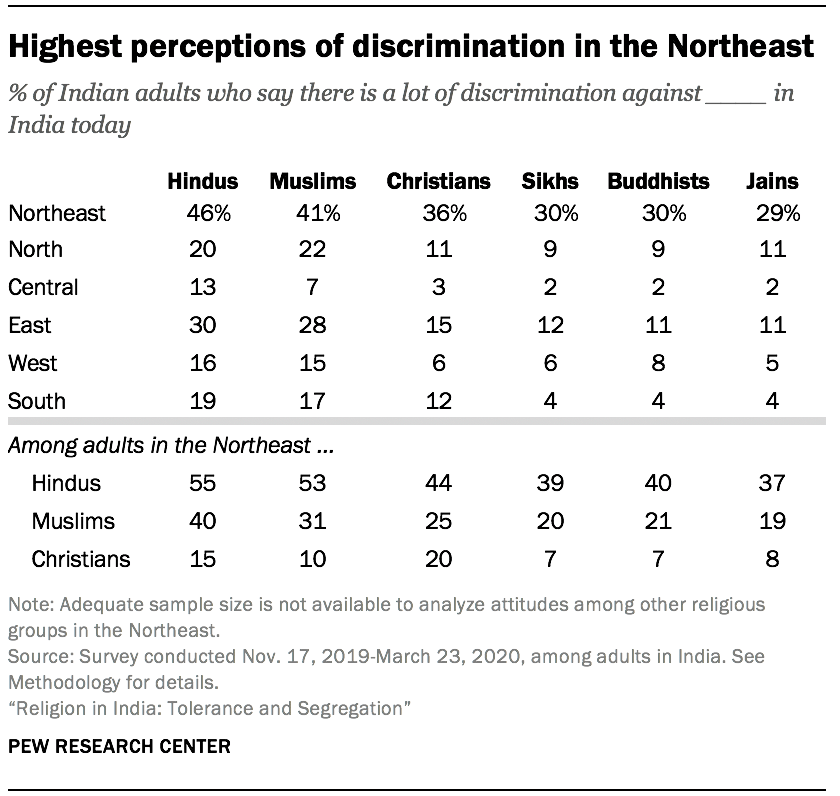
Indians in the Northeast are more likely than those elsewhere to perceive high levels of religious discrimination. For example, roughly four-in-ten in the region say there is a lot of discrimination against Muslims in India, about twice the share of North Indians who say the same thing (41% vs. 22%).
Much of the Northeast’s perception of high religious discrimination is driven by Hindus in the region. A slim majority of Northeastern Hindus (55%) say there is widespread discrimination against Hindus in India, while almost as many (53%) say Muslims face a lot of discrimination. Substantial shares of Hindus in the Northeast say other religious communities also face such mistreatment.
The region’s other religious communities are less likely to say there is religious discrimination in India. For example, while 44% of Northeastern Hindus say Christians face a lot of discrimination, only one-in-five Christians in the Northeast perceive this level of discrimination against their own group. By contrast, at the national level, Christians are more likely than Hindus to see a lot of discrimination against Christians (18% vs. 10%).
People in the Northeast also are more likely to report experiencing religious discrimination. While 17% of individuals nationally say they personally have felt religious discrimination in the last 12 months, one-third of those surveyed in the Northeast say they have had such an experience. Northeastern Hindus, in particular, are much more likely than Hindus elsewhere to report recent religious discrimination (37% vs. 17% nationally).
Most Indians see communal violence as a very big problem in the country
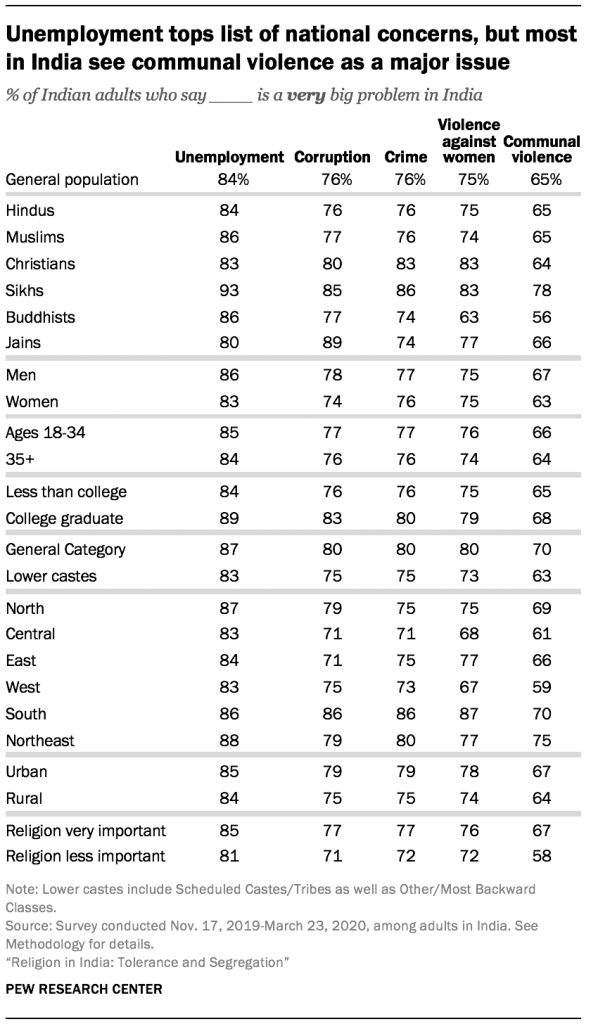
Most Indians (65%) say communal violence – a term broadly used to describe violence between religious groups – is a “very big problem” in their country (the term was not defined for respondents). This includes identical shares of Hindus and Muslims (65% each) who say this.
But even larger majorities identify several other national problems. Unemployment tops the list of national concerns, with 84% of Indians saying this is a very big problem. And roughly three-quarters of Indian adults see corruption (76%), crime (76%) and violence against women (75%) as very big national issues. (The survey was designed and mostly conducted before the World Health Organization declared the COVID-19 outbreak a pandemic.)
Indians across nearly every religious group, caste category and region consistently rank unemployment as the top national concern. Buddhists, who overwhelmingly belong to disadvantaged castes, widely rank unemployment as a major concern (86%), while just a slim majority see communal violence as a very big problem (56%).
Sikhs are more likely than other major religious groups in India to say communal violence is a major issue (78%). This concern is especially pronounced among college-educated Sikhs (87%).
Among Hindus, those who are more religious are more likely to see communal violence as a major issue: Fully 67% of Hindus who say religion is very important in their lives consider communal violence a major issue, compared with 58% among those who say religion is less important to them.
Indians in different regions of the country also differ in their concern about communal violence: Three-quarters of Indians in the Northeast say communal violence is a very big problem, compared with 59% in the West. Concerns about communal violence are widespread in the national capital of Delhi, where 78% of people say this is a major issue. During fieldwork for this study, major protests broke out in New Delhi (and elsewhere) following the BJP-led government’s passing of a new bill, which creates an expedited path to citizenship for immigrants from some neighboring countries – but not Muslims.
Indians divided on the legacy of Partition for Hindu-Muslim relations
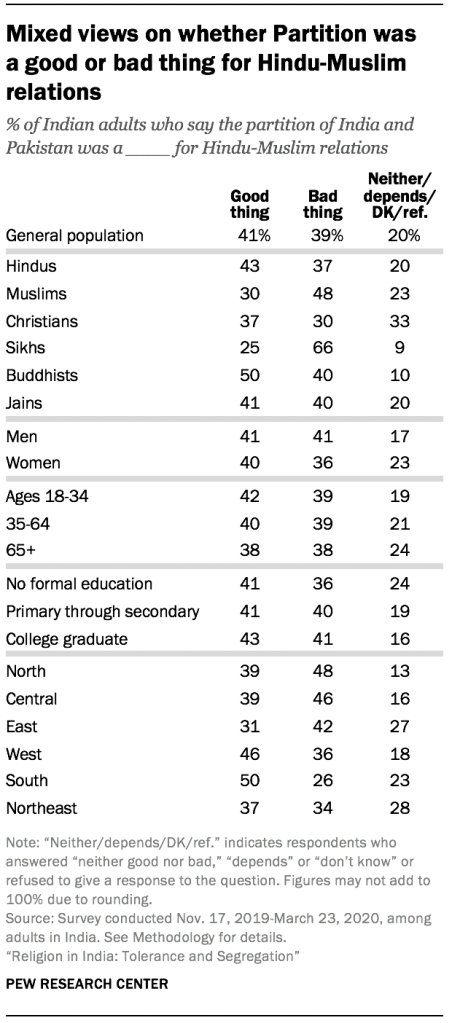
The end of Britain’s colonial rule in India, in 1947, was accompanied by the separation of Hindu-majority India from Muslim-majority Pakistan and massive migration in both directions. Nearly three-quarters of a century later, Indians are divided over the legacy of Partition.
About four-in-ten (41%) say the partition of India and Pakistan was a good thing for Hindu-Muslim relations, while a similar share (39%) say it was a bad thing. The rest of the population (20%) does not provide a clear answer, saying Partition was neither a good thing nor a bad thing, that it depends, or that they don’t know or cannot answer the question. There are no clear patterns by age, gender, education or party preference on opinions on this question.
Among Muslims, the predominant view is that Partition was a bad thing (48%) for Hindu-Muslim relations. Fewer see it as a good thing (30%). Hindus are more likely than Muslims to say Partition was a good thing for Hindu-Muslim relations (43%) and less likely to say it was a bad thing (37%).
Of the country’s six major religious groups, Sikhs have the most negative view of the role Partition played in Hindu-Muslim relations: Nearly two-thirds (66%) say it was a bad thing.
Most Indian Sikhs live in Punjab, along the border with Pakistan. The broader Northern region (especially Punjab) was strongly impacted by the partition of the subcontinent, and Northern Indians as a whole lean toward the position that Partition was a bad thing for Hindu-Muslim relations (48%) rather than a good thing (39%).
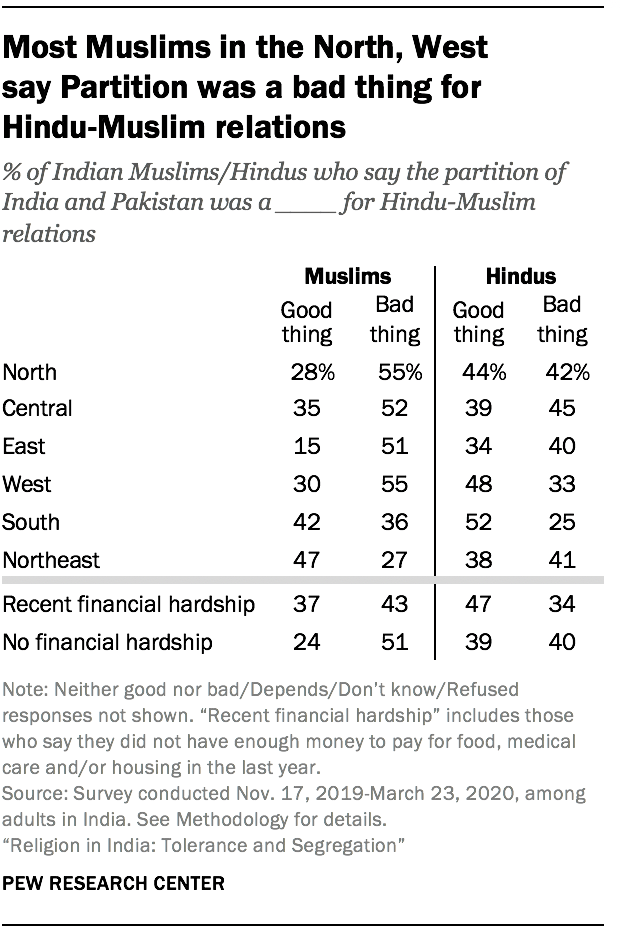
The South is the furthest region from the borders affected by Partition, and Southern Indians are about twice as likely to say that Partition was good as to say that it was bad for Hindu-Muslim relations (50% vs. 26%).
Attitudes toward Partition also vary considerably by region within specific religious groups. Among Muslims in the North and West, most say Partition was a bad thing for Hindu-Muslim relations (55% of Muslims in both regions). In the Eastern and Central parts of the country as well, Muslim public opinion leans toward the view that Partition was a bad thing for communal relations. By contrast, Muslims in the South and Northeast tend to see Partition as good for Hindu-Muslim relations.
Among Hindus, meanwhile, those in the North are closely divided on the issue, with 44% saying Partition was a good thing and 42% saying it was a bad thing. But in the West and South, Hindus tend to see Partition as a good thing for communal relations.
Poorer Hindus – that is, those who say they have been unable to afford basic necessities like food, housing and medical care in the last year – tend to say Partition was a good thing. But opinions are more divided among Hindus who have not recently experienced poverty (39% say it was a good thing, while 40% say it was a bad thing). Muslims who have not experienced recent financial hardship, however, are especially likely to see Partition as a bad thing: Roughly half (51%) say Partition was a bad thing for Hindu-Muslim relations, while only about a quarter (24%) see it as a good thing.




